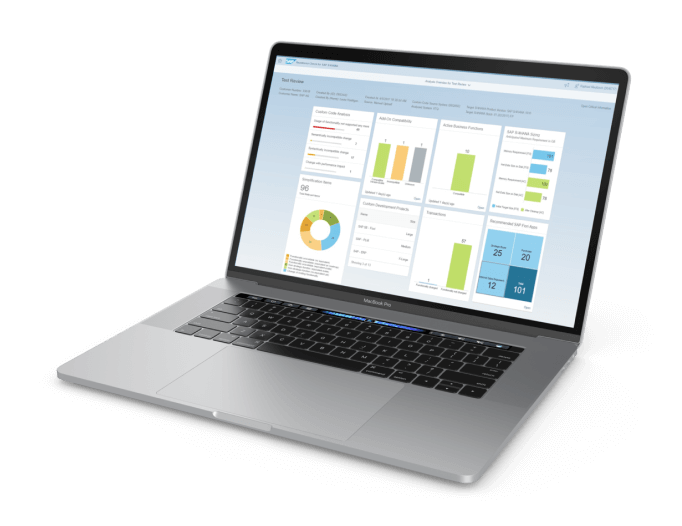
SAP ERP Central Component
About SAP ECC
SAP ERP Central Component (SAP ECC) is an enterprise resource planning (ERP) system that is installed on-premises. In real time, ERP integrates digital information created in one part of a business with data from other parts of the same business. This means that an update in one part of the business, such as sales, will cause updates in other parts of the business, such as inventory. Managers can make data-driven decisions to optimize core business processes when they have a unified view of enterprise resources.
SAP ECC is typically implemented in medium and large-sized businesses, and it was designed for use in a wide range of industries, including pharmaceuticals, chemicals, and steel, as well as fast-moving consumer goods. It serves as the foundation for SAP Business Suite, which also includes components or modules like SAP Customer Relationship Management and Supply Chain Management.
SAP ECC benefits to help lay a solid foundation for your business
When SAP moved from R/3 to SAP ECC, the documentation officially switched from the term module to the term component, but many in the industry continue to use the term module.
Components of SAP ECC have been integrated to cooperate. The terms “module” and “component” generally refer to a section of the software that was independently created to manage a specific set of business processes (see figure). Ten functional core components, or modules, and two technological components make up ECC.
The business functions covered by the frequently used functional modules that are part of SAP ECC are listed below.

FICO
The two modules that make up SAP FICO (SAP Finance and SAP Controlling) respectively handle cost planning and monitoring and financial accounting and reporting. Together, they give businesses the ability to manage, consolidate, and store all of their financial data, transaction history, and financial analytics in one location.

Project System (PS)
PS is designed to oversee large, complicated projects like establishing a new manufacturing facility or keeping track of a facility's maintenance turnaround. It is ensured that this module can accurately allocate project costs while keeping them within budget by funneling all project-specific purchases or production through PS.

Plant Maintenance (PM)
The PM module keeps an eye on equipment and operational areas, such a boiler room or chiller room, to make sure they are running properly. To avoid machine breakdowns and production halts, it delivers alerts when problems are found. Preventive, corrective, and refurbishment maintenance are all covered by the SAP PM component.

Sales and Distribution (SD)
The SD module oversees the main sales and distribution activities. Sales of goods or services made directly to clients or via distribution channels fall under this category. Additionally, SD manages billing, credit issuance, and client returns.

Human Capital Management (HCM)
HR-related tasks are managed via the HCM module. Payroll, time management tasks including attendance and vacation time, job advancement, travel, and workplace safety are all included. Sub modules that can be used as needed are present in functional modules.

Customer Services (CS)
The business procedures for doing maintenance on equipment owned by customers are handled by the CS module. Additionally, CS includes the choice to charge clients for maintenance services to the rendered.

Materials Management (MM)
The Materials Management (MM) module controls procedures linked to inventory, including physical inventory counts and reconciliation, as well as the acquisition of goods and services from vendors. Additionally, Materials Management (MM) oversees all product issuance, receipts, and material transfers from one facility or storage place to another.

Production Planning (PP)
Businesses can more efficiently manage product production, sales, and distribution by matching demand with manufacturing capacity with the help of the Production Planning(PP) module. Production Planning(PP) can be used for discrete, process, repetitive, or a combination of more than one form of production, playing a crucial part in a manufacturer's supply chain.

Quality Management (QM)
The procurement, production, sales, and equipment maintenance operations are all deeply integrated with the QM module. Complete internal or external audit management is one of the advanced features. To assure continuing quality improvements to a company's business processes, QM can also help in identifying the fundamental causes of product failure.
SAP ECC Technical Components
For an ECC implementation, the technological components ABAP and NetWeaver were required. Custom development that is specific to a firm is supported via the ABAP component. Businesses utilized it to create unique reports or particular reporting formats to meet the needs of legal or financial reporting requirements.
System management is done using the NetWeaver component. Companies can provide individuals or groups certain responsibilities and capabilities according to it.

SAP ECC to S4 HANA Migration
The process of moving the SAP ERP System from the ECC platform to the HANA platform, which supports both on-premises and cloud computing, is known as SAP HANA Migration. The SAP ECC database is being converted to HANA technology, to put it briefly.
Your legacy ERP system is already out of date when it comes to utilizing the innovative technologies required to remain competitive today, even if SAP ECC 6.0 will receive full support until 2027. The moment is now to switch to our cutting-edge, intelligent ERP, with over 8,700 customers now using SAP S/4HANA and hundreds more going live every month.
Maximizing Benefits: ECC to S/4 HANA Migration
Unlocking the Power of Digital Transformation with ECC to S/4 HANA Migration
In order to better serve data storage and data analysis requirements, SAP S/4HANA offers enhanced scalability. Additionally, scaling up has no negative effects on processing rates due to the in-memory architecture of SAP’s HANA database. In reality, SAP S/4HANA makes it possible to plan, carry out, analyze, and generate reports using real-time data at exponentially faster rates. Companies may now make informed decisions based on data much more quickly because of this enhanced speed.
Efficiency meets innovation: Experience the power of ECC to S/4 HANA migration for streamlined business processes.
The unified platform of SAP S4/HANA enables businesses to automate key business processes. It gives businesses the freedom to use newer technologies for better internal communication and integration that go beyond their prior IT constraints.
The streamlined, user-friendly design of SAP S/4HANA across a variety of form factors, including desktop, tablet, and mobile devices, is one of the system’s most notable and obvious benefits. For effective management and IT administration, the solution is offered with user-friendly interfaces and readily available data. Because it has a consolidated network and hardware resources, the SAP S/4HANA architecture is better suited for digital transformation. This is particularly important if moving to the cloud because S/4HANA was created to automatically optimize for the cloud environment.
Businesses using SAP S/4HANA benefit from a streamlined IT infrastructure. The system has transactional capabilities as well as the ability to process higher volumes of data. By doing more with less, businesses may cut down on recurring operating expenses like hardware and accelerate time to value. Deployment choices like cloud, on-premises, or hybrid can further simplify the IT environment, cut back on superfluous infrastructure spending, and maximize total cost of ownership (TCO).
One of the main forces for the quick shift to the cloud is SAP S/4HANA. Many businesses now understand that adopting the most recent technological developments can support their growth strategy. AI, machine learning, and embedded, real-time predictive data analytics are all included in SAP S/4HANA. With new technologies like conversational UI, predictive accounting, and others, SAP keeps improving the system. It also makes big data and the Internet of Things accessible (IoT).
The goal of SAP’s development team has been to make SAP S/4HANA compatible with other SAP apps. This applies to both SAP solutions that are already in existence and those that will be introduced in the future. This functionality is especially useful for businesses that already use SAP products like Ariba, SAP Analytics Cloud, and Field Glass since it makes it simple to integrate SAP S/4HANA into their current SAP ecosystem.
The adaptability and relevance of IT assets are tested during periods of market turbulence. Businesses must choose solutions that are resilient to market changes and future-proof. With the aim of creating a company that endures the test of time and is more easily adaptable to market changes, upgrading older ERP platforms to SAP S/4HANA can assist businesses in fast adapting to shifting market dynamics.
The old ERP platform, SAP ECC, will be phased out by 2027. For seamless business continuity, organizations reliant on ECC should move to SAP S/4HANA right away.
Only running on SAP’s in-memory HANA database, SAP S/4HANA offers businesses greater speed for intricate and time-sensitive business operations. This outstanding performance is the result of a variety of cutting-edge features and capabilities that it is outfitted with. For instance, SAP S/4HANA has robust supply chain apps that are real-time and strong and assist forecasting, planning, and quick decision-making. Each quarter, SAP introduces new S/4HANA features and apps that enhance the functionality, effectiveness, and intelligence of the platform’s core.


